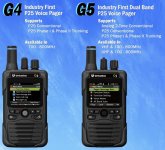Back when the earth was still cooling and us volunteer firefighters were riding dinosaurs to fires, we carried pagers (or, sorry, "tone receivers") which were parked on the one analog frequency our department used, and had physical plug-in pieces that were tuned to our specific alerting tones. These worked beautifully for the purpose for which they were designed, and many of them lasted for dozens of years (though as with everything, more than once I was handed a pager that a firefighter had managed to break or drown, despite their near-indestructibility). As technology advanced, so did the pagers, with programmable software-defined alert detection and etc., though the later ones paled in comparison to the original devices.
When trunking came along and fire departments started migrating to those systems, firefighters (and EMS, rescue squad, search and rescue, and others that used the tech, as you suggested in your post) started asking manufacturers to develop a 'trunking pager'. The response was invariably 'yeah yeah, we're working on it, you'll see it at the trade show next year, it's gonna be great'. Same thing was said over and over year after year, and continued when digital comms began coming to the fore. The old pagers, even the latest versions, were only good for analog 'conventional' (non-trunked) channels - to the point where even today, some agencies specifically maintain an analog conventional channel for alerting, which may or may not be patched to their trunked system.
Unication were the ones who finally developed a 'pager' that followed a trunking system. They still basically do the same thing - they listen to a radio channel for a specific set of tones, and alert the user when those tones go off, and play (and/or record for later playback) the audio that immediately follows the tones. As you say, they weren't intended for scanner hobbyists, but they are a relatively less expensive option for monitoring a digital trunk system compared to the modern scanners which will cost much more.


